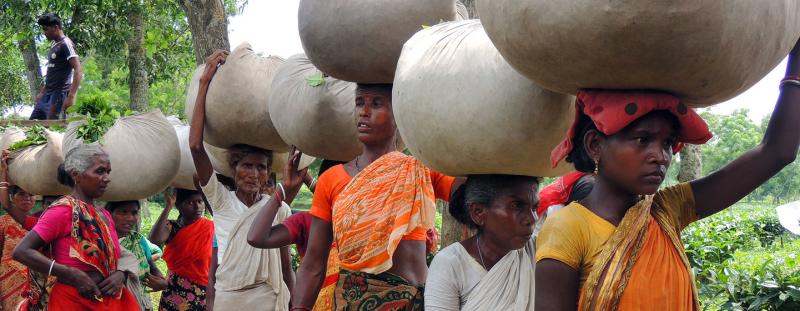

Tea garden workers in Bangladesh, who are mainly women, are one of the most marginalized groups in the country, with limited access to education for their children and prone to dire health risks. A programme supported by the UN’s Joint SDG Fund, which funds initiatives focused on sustainable development, aims to boost social protection for these works, helping them access their rights and improve their life prospects.
“During my pregnancy, my family planned to help me deliver my baby at home, following in the footsteps of my ancestors”, says tea worker Ruma Munda. “I was never aware that there were alternative, safe methods of childbirth delivery, in health care facilities with clinical specialists."
“My husband, Sunil, is also a tea garden worker, and we were never introduced to modern medicine or midwives.”
Ms. Munda’s story is an example of the health challenges faced by tea workers, most of whom have more than three children, partly because of difficulties in receiving family planning services. However thanks to the programme, couples can improve their knowledge and take advantage of their right to access family planning methods.
“One day, I participated in an awareness session, which is where I learned about prenatal care, birth planning, and safe delivery care at a clinic”, says Ms. Munda. “When I shared the information with my husband and family, we decided to seek health care from a secure clinic.
“As a result, I visited the facility for prenatal care, and they made me aware of what to expect and how to tend to my new-born child after birth.”
“During the delivery, I was aided by a tea garden volunteer who transferred me to a health facility where I delivered my healthy baby with the assistance of a midwife. Now I am a strong advocate for the Rajghat tea garden maternal health care for all expecting mothers, so they know they have the same right to access quality care”.
Approx. 360,000 workers and their families in 166 commercial tea gardens, especially women and girls who represents 64 perfect of the working population, are some of the last mile marginalized people in Bangladesh. Over half of the tea garden workers are women and most of them are tea leaf pickers, and others work in tea factories.
Bangladesh is amongst the leading tea exporters in the world, with hundreds of plantations across the country. The tea industry is dominated by female workers who, despite long hours and labour-intensive work, receive very little pay and face harsh conditions.
The programme is making a difference to their lives in several ways, helping couples to improve their knowledge and right to access family planning methods, and providing education on sexually transmitted diseases and, for adolescents, information on health and child marriage prevention methods.
“I had no idea about menstrual hygiene”, says Akhi, an adolescent girl from Mirzapur Teagarden. “I now know, for the first time in my life, why this is so important, and why cleanliness, changing clothes frequently, and taking a regular bath is essential.
“I started following those messages and now I feel more confident. I am also encouraging my peers to do the same and share the information from the awareness sessions for adolescent girls”.
The sessions have helped women feel more empowered, and more likely to stick up for their rights. Srimoti Bauri, a tea garden worker is one of the three women Vice-Chairmen of the Cha Sramik Union (Tea Garden Workers’ Union) valley committees.
“I am forever grateful to this programme for providing me with the opportunity to speak on behalf of my fellow left-behind women tea garden workers and share their struggles”, says Ms. Bauri. “I never thought I could speak up for our rights and contribute to the empowerment of women tea garden workers like me. This gives us courage and strength to fight for our rights and change this system for the better.”
“I am hopeful that women like me will be able to break the vicious cycle of deprivation and exploitation of tea garden workers. Through this initiative, women tea garden workers and their families can finally achieve improved access to better education and skills, and raise their voices against discrimination and injustice in the tea gardens”.
Originally published on UN News